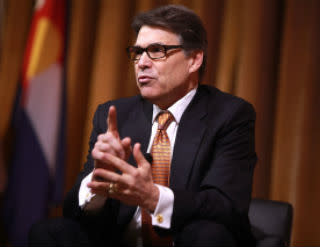Rick Perry and the ‘rule of law’

Texas Gov. Rick Perry
For the first time in nearly a century, a sitting Texas governor faces criminal charges for alleged “abuse of official capacity” and “coercion of a public official” in an ongoing dispute with a local district attorney.
Gov. Rick Perry, the state’s longest-serving chief executive who is fast approaching the end of his third full term and his 14th year in office, was indicted by a Travis County grand jury last week for threatening to veto $7.5 million in funding for the Texas Public Integrity Unit unless Travis County district attorney Rosemary Lehmberg resigned from her post.
Last spring, Lehmberg was arrested and convicted of drunk driving, with video of her roadside sobriety test making the rounds online. Perry has pointed to the incident as justification for his push to appoint a new DA.
However, the public corruption team overseen by Lehmberg had opened an investigation into claims of improper grants awarded by the Cancer Prevention and Research Institute of Texas, an organization created by Perry and staffed by his allies.
As a result, Texans for Public Justice filed a complaint just over a year ago that accused Perry of unlawfully wielding his veto power against the DA’s office.
A federal judge subsequently appointed special prosecutor Michael McCrum to investigate the claims. This week’s indictments are the product of his findings.
“This clearly represents political abuse of the court system, and there is no legal basis in this decision,” said David L. Botsford, a member of Perry’s defense team. “The facts of this case conclude that the governor’s veto was lawful, appropriate and well within the authority of the office of the governor.”
McCrum flatly rejected Botsford’s analysis.
“He can only be implying that it’s either me, or the grand jury, who are motivated by politics, and that’s not only ridiculous, but it’s disappointing,” said McCrum. “My investigation not only did not involve that, but my conversations with Mr. Botsford have never involved that. It’s always been about the facts and the law.”
Lyle Denniston, a correspondent for SCOTUSblog and a regular contributor to Constitution Daily, says “it is too soon to say” what is happening in Texas.
“There is a long and quite bitter history of political conflict between Republican statewide leaders and the Democratic leaders of local government entities in Austin,” he wrote, “and the Perry veto incident is not the first to draw complaints that local prosecutors have used the criminal law to make political points.”
For his part, Perry showed no sign of backing down on Tuesday as he entered the Travis County courthouse for booking. “I’m going to enter this courthouse with my head held high,” he said, “knowing the actions that I took were not only lawful and legal, but right.” Perry went on:
This issue is far bigger than me. It’s about the rule of law. It’s about the constitution that allows not just the governor, but every citizen, to speak their mind free of political interference or legal intimidation. This indictment is nothing short of an attack on the constitutional powers of the office of governor. There are fundamental issues at stake, and I will not allow this attack on our system of government to stand.
Indeed, the embattled governor has found support—or at least passive indifference—in the most unlikely places.
Wendy Davis, the current Democratic candidate to succeed Perry next year, did not call on him to resign. “There will be, I’m sure, more information that comes to light,” she said. “I trust that the justice system will do its job.”
Her Republican opponent, Texas attorney general Greg Abbott, simply said, “I don’t know what to think of it.”
Other commentators have been less circumspect about the proceedings.
“Everybody, liberal or conservative, should stand against this indictment,” said Harvard law professor Alan Dershowitz. “If you don’t like how Rick Perry uses his office, don’t vote for him.”
Calling himself a “liberal Democrat who would never vote for Rick Perry,” the renowned litigator lamented “another example of the criminalization of party differences,” a practice more commonly observed in undemocratic nations abroad.
“There is no room in America for abuse of office charges, and this has to stop once and for all,” said Dershowitz. “This is a serious problem.”
But Jeffrey Toobin of the New Yorker isn’t so sure cries of political prosecution will succeed.
“[C]ourts give prosecutors virtual carte blanche to bring some cases and ignore others,” he wrote. “But, once they do bring them, courts respond to the argument that ‘everyone does it’ more or less the same way that your mother did. It’s no excuse. So if Perry’s behavior fits within the technical definition of the two statutes under which he’s charged, which it well might, he’s probably out of luck.”
Nicandro Iannacci is a web strategist at the National Constitution Center.
Recent Stories on Constitution Daily
Constitution Check: Should criminal charges be used to settle a political dispute?
More journalist arrests in Ferguson add to First Amendment media debate

